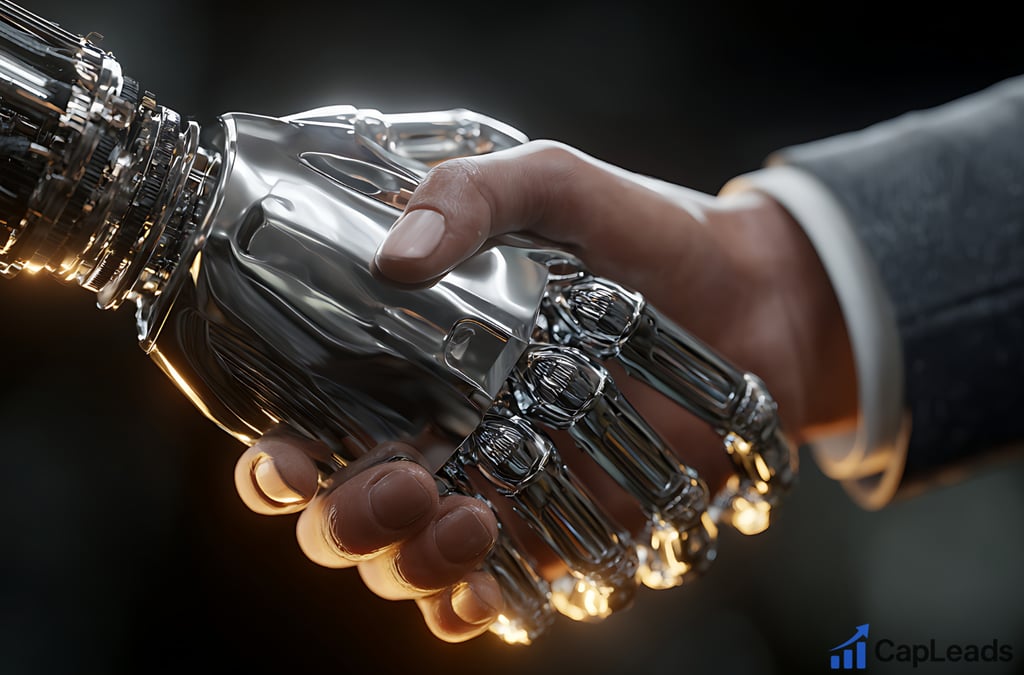Should I Thank AI Every Time It Helps Me?
A short, thoughtful story about a simple question that says a lot about how we relate to technology. Inspired by a real moment between a father and his daughter, this piece explores gratitude, empathy, and what it means to stay human in a world powered by AI.
REFLECTIONSTECHNOLOGY AND HUMANITYFOUNDER'S JOURNALMODERN WORK CULTURE
CapLeads Team
10/27/20252 min read


Should I Thank AI Every Time It Helps Me?
The other night, my eight-year-old daughter — still in elementary school — asked me a question that caught me completely off guard.
She said, “Dad, should I thank ChatGPT every time it helps me?”
I laughed at first — not because it was funny, but because I didn’t expect it from her. I actually knew the answer, but hearing it in that moment made me pause. It’s one of those simple questions that suddenly open a deeper door when you stop and think about them.
She wasn’t really asking about technology. She was asking about kindness. About whether gratitude still matters when the thing helping you isn’t human.
And that question has stayed with me ever since.
We live in a time when AI writes, designs, edits, analyzes, and assists in almost everything we do. It helps us build businesses faster, test ideas instantly, and simplify the things that used to take hours. But in that speed and efficiency, it’s easy to lose the pause — that small human moment of appreciation.
When my daughter asked that question, I realized something: saying thank you isn’t about who receives it. It’s about who we become when we give it. Gratitude isn’t for the AI. It’s for us — a reminder to stay aware, humble, and grounded, even when the world around us feels automated.
And it made me think about CapLeads — and the irony of building something rooted in data, while trying to stay deeply human. Every record in a dataset represents someone real: a founder trying to scale, a marketing manager buried in campaigns, a salesperson chasing targets. They’re not just entries in a spreadsheet; they’re people navigating the same chaos we all do.
Every dataset we touch represents thousands of small chances — chances to connect, to be useful, to respect someone’s time. Gratitude in this space doesn’t come in words; it comes in discipline. In cleaning, validating, and sending messages that actually mean something. That’s how we say thank you — by refusing to treat people like numbers.
Because good data isn’t just clean — it’s considerate.
It’s built with the intent to connect, not exploit.
The truth is, I do thank AI sometimes. Not because it needs it, but because it’s my way of keeping empathy alive. It’s a quiet reminder that even in a world built on systems, automation, and precision — the most valuable thing we can hold on to is our humanity.
So, should we thank AI every time it helps us?
Maybe not every time.
But maybe enough to remember that it’s still us behind the keyboard — thinking, choosing, and creating with intention.
And maybe that’s the real balance the future is asking for.
Related Posts
Why Email Bounces Kill Your Cold Campaigns (and How to Prevent Them)
Why Startups Struggle to Find Quality Leads (and How to Finally Fix It
The New Era of Smart B2B Prospecting
Cheap Leads Cost More: How Junk Data Destroys Early-Stage Growth
Inside the Data Lab: Lessons From Cleaning 150,000 B2B Leads (and Counting)
We Validated 30,000 B2B Leads — 30% Were Fake. Here’s What We Found.
How Verified Leads Improve Cold Email Deliverability
How We Helped a SaaS Startup Drop from 7% Bounce to 0.8%
CapLeads Email Outreach Is Here — From Verified Leads to Live Campaigns in Weeks
There’s No Such Thing as a 1-Day Cold Email Campaign — Yet We’ve Seen Promises of Such Things
Connect
Get verified leads that drive real results for your business today.
www.capleads.org
© 2025. All rights reserved.
Serving clients worldwide.
CapLeads provides verified B2B datasets with accurate contacts and direct phone numbers. Our data helps startups and sales teams reach C-level executives in FinTech, SaaS, Consulting, and other industries.
